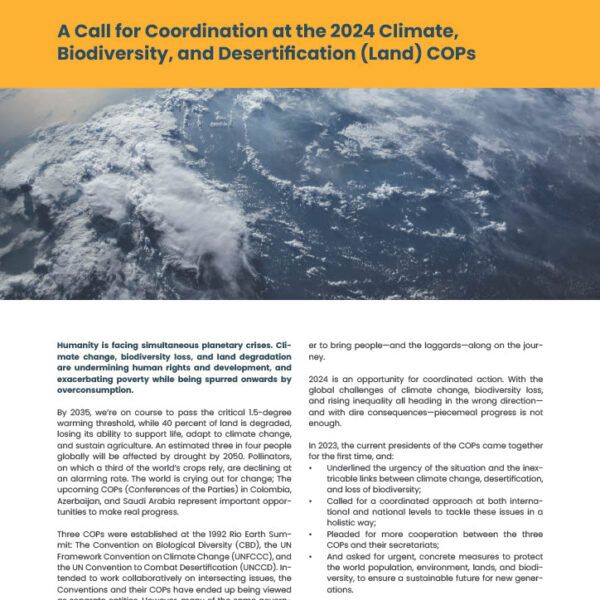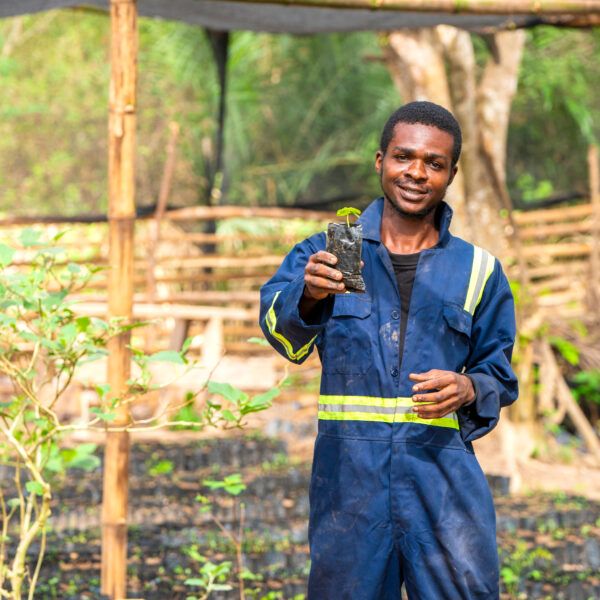We are committed to improving environmental and social issues on certified cocoa farms in West Africa.
The Rainforest Alliance is aware of an investigative report published on October 23, 2019 in the Washington Post, which highlights challenges in cocoa farming in West Africa, one of the most important cocoa-producing regions in the world. The Rainforest Alliance became aware of these challenges after our regular monitoring activities identified non-compliances with our certification standard. After conducting due diligence, we decertified select certificate holders and in April 2019, we launched our Cocoa Assurance Plan described in further detail below.
We recognize the challenges in cocoa farming in West Africa; the existence of these challenges is a key reason why we have chosen to work in these countries, to support cocoa producers, and to continue working with all actors in the global supply chain towards a more sustainable cocoa sector. We welcome inputs such as this as they help inform our continued efforts to improve conditions on certified farms and plantations in the 60 countries where we work.
The Rainforest Alliance remains committed to improving environmental and social issues on certified cocoa farms in West Africa and beyond. We believe we have a shared responsibility, along with other actors in the global supply chain, to help bring the cocoa sector in West Africa to a more sustainable reality.
Our Cocoa Assurance Plan
The Rainforest Alliance is continuously working to improve its standards and auditing practices. For example, we have proactively taken steps to strengthen the assurance mechanisms of certification audits, including increased and periodic unannounced audits across all sectors and regions.
In April 2019, we informed all relevant stakeholders working in Ghana and Côte d’Ivoire about our Cocoa Assurance Plan, which includes a one-year pause on any new cocoa certifications in Ghana and Cote d’Ivoire, the de-certification of select certificate holders, and additional measures building on actions taken in previous years to improve the assurance element of our certification program.
Additionally, four auditing firms (Africert, Bureau Norme Audit, Bureau Veritas and Control Union), which perform audits for a large portion of UTZ certified groups, were reprimanded, and two are prohibited from conducting certification audits or certifying any new clients.
Certification bodies are independent, third-party agencies that hire and train auditors to perform farm audits within specific certification schemes. It is important to note that corruption was not the cause for any of the sanctions given earlier this year. In its fifteen year-history, UTZ has investigated and confirmed only isolated cases of proven corruption.
Reimagining certification
The Rainforest Alliance 2020 Certification Program, now in development, is the first step in the journey to reimagine certification. This new approach means – among other things – new rules and procedures in working with certification bodies, strengthening our assurance systems through auditor and certification body training, and harnessing the power of new technology (such as geospatial analysis) to dramatically increase accuracy and efficiency of assurance.
A certification system must adapt and innovate to changing conditions on the ground in order to maximize impact and provide value to producers and companies. We have worked consistently to improve our standards, assurance mechanisms, and associated interventions and will continue to do so. The next evolution of our certification program will include more transparent data standards, a clearer focus on continuous improvement, and a new, innovative approach to assurance.
Child labor
A 2018 Wageningen University report states that child labor is still a major challenge in cocoa production on certified and non-certified farms. The Rainforest Alliance welcomed this independent evaluation, which provides valuable evidence and insights about the effectiveness and limitations of the UTZ certification program and related services in Côte d’Ivoire over the time period of 2013-2017. Read our full response.
The current Rainforest Alliance standard focuses on the prohibition of child labor and sanctioning through de-certification. However, a simple prohibition approach does not necessarily remedy the root causes of child labor. We are seeing a growing body of evidence that due diligence approaches, training, and remediation have better impact than simple prohibition. In the current UTZ standard, this is already implemented with a system requiring groups and farms to assess their risk of child labor. In the case of a risk, certificate holders are required to set up a system to identify and remediate child labor. This Child Labor Monitoring & Remediation System (CLMRS) is based on established best practices, and it is often implemented by companies in cooperation with the NGO International Cocoa Initiative (ICI).
The Rainforest Alliance intends to build on this CLMRS approach in our new certification program. This new approach incentivizes groups of farmers and individual farmers to address the root causes of child labor in partnership with government, civil society, and supply chain actors through a proactive and comprehensive methodology. The assurance and improvement plan will focus on verifying the effectiveness and reach of the identification and remediation systems (assess and address approach) instead of on the prevalence of child labor. This new approach is aligned with the United Nations Guiding Principles of Business and Human Rights.
The Rainforest Alliance (as was UTZ previously) is a partner in the International Cocoa Initiative, a foundation that unites the forces of the cocoa and chocolate industry, civil society, farming communities, and national governments in cocoa-producing countries to ensure a better future for children and to advance the elimination of child labor.
Protected areas / deforestation
Deforestation and forest degradation are critical sustainability challenges in the Ivorian cocoa sector. The Rainforest Alliance and UTZ standards both prohibit the destruction of forests and illegal cultivation in protected areas, with some variation in the specifics of these requirements. The certification programs include additional guidance and training for auditors. Local auditors are trained to identify deforestation and related non-compliances during the audits in compliance with the standards.
Preventing agriculture-driven deforestation is core to the Rainforest Alliance’s mission. Technological developments and an increasing number of reports of deforestation led us to undertake a risks analysis in Côte d’Ivoire, which we started in 2017 and concluded in 2018. As a result, we identified 61 high-risk groups for either proximity to protected areas or a high degree of forest cover loss. In 2018, we required these 61 UTZ certified groups to supply GPS points for 100% of their farms. Moving forward we will require 100% of all certified farms in Ghana and Côte d’Ivoire to be GPS mapped.
Our alliance
The Rainforest Alliance works at the intersection of business, agriculture, and forests. We believe that partnership and collaboration are key to addressing the major challenges faced in the cocoa sector. Our work is a joint effort with producers and other actors in the supply chain; without the collaboration of these other actors – including governments, companies and NGOs – no single stakeholder can resolve these challenges alone.



